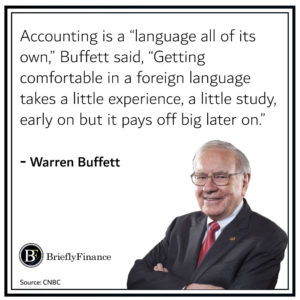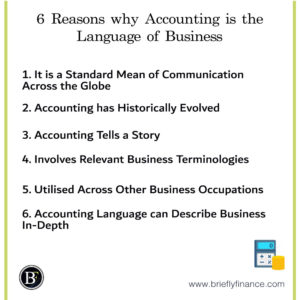Warren Buffet is often associated with describing accounting as the language of business. Just like any other type of language, accounting plays an essential role of communicating financial information

Source: CNBC
Accounting is known as the language of business because it serves as the mode of communication that is used to pass on information in the business world.
Businesses deal with their investors and creditor whose vested interests are based on the ongoing success of the venture. If any type of business is unable to meet its obligations, it will have no choice but to shut down.
Accounting information makes it possible to keep track of its finances and prevent it from closing down.
Let us discuss the 6 reasons why accounting is the language of business.
-
It is a Standard Mean of Communication Across the Globe
Accounting is generally regarded as a language that is understood around the globe, just like music and art, it is an intrinsic part of daily life. Numbers function in the same way regardless of where you are located in the world.
Learning accounting is a task that is comparable to becoming familiar with a new language. However, the dynamic nature of business can make this language appear to be complicated. It is constantly changing to accommodate different situations and provide better ways to communicate.
Accounting take a practical approach by being standardised, making it a form of communication that is developing concepts and principles as time goes on through accounting rules and regulations.
For example, understanding balance sheets does not require the services of a professional interpreter, which is evident in how global business deals and mergers are carried out.
While an investor might not be well-versed in the intricate details of a particular industry, all it takes for them to determine whether or not a business can possibly be a worthwhile investment is to go through the organisation’s financial statements.

Source: riftaccounting.com
-
Accounting has Historically Evolved
Accounting has been in existence since time immemorial from the advent of monetary transactions. It has undergone an evolution, similar to the changes that various languages have gone through in response to the financial and social needs of any society.
People from different civilisations have sustained a range of human activities, including the way they speak and keep records of their business ventures. The discovery of ancient tablets that detailed wages around 600 BC in Babylonia makes it clear that there has been a need for proper accounting and communication for a long time.

Source: boox.co.uk
-
Accounting Tells a Story
Accounting financial reports are like storybooks that describe how a company is performing financially, when key decision makers and executives discuss their organisations wellbeing, they usually speak in reference to their fiscal statements.
Liabilities, debt, expenses and earnings are among the aspects of financial documents that everyone needs to be able to understand to facilitate clear communication in business.

Source: nasba.org
-
Involves Relevant Business Terminologies
All languages have certain terminologies and accounting is not an exception to this rule. People who hold essential financial positions within a business setting are required to learn how to communicate by using accounting as a language. They must learn the specifics of unique terms and their meanings to ensure that they use them effectively and properly on a regular basis.
Terms in accounting such as general ledgers and balance sheets are used frequently in the business world but some people do not know what these terms mean because they are not familiar with the language.
If your job involves making decisions about an organisation’s finances, you must know what various financial documents look like as well as the components of these documents, how to read them and express them.
Source: careercast.com
-
Utilised Across Other Business Occupations
Along with the language of accounting, finance is another crucial means of communication. It works by taking the information and data that are provided in accounting documentation and translates it to form the basis of certain business decisions.
Having a career in finance not only requires you to be able to translate the accounting language, it also involves asking appropriate questions that cover aspects such as the meaning and implication of certain numbers.
For instance, overhead is a major expense for many organisations but this is an expense that may be spread across different products or allocated as one large cost. Comprehending what numbers signify is an essential aspect of speaking with ease in business.
In addition to the languages of accounting and finance, economics provides another way to communicate in a business environment. A clear understanding of the concepts of supply and demand is necessary for pricing different products and predicting the demand for them.
Combining accounting, finance and economics languages can make it possible for the manager to assess the accountant’s perception of costs, cash flow, prices and volumes in order to make an informed choice. Decisions in business are usually made under uncertain circumstances. Understanding the different languages that are used in business is vital for making the best possible decisions.

Source: crowther.accountants
-
Accounting Language can Describe Business In-Depth
Accounting as a language has the responsibility of applying in-depth knowledge of its principles to a practical business field to ensure that the financial position and income of companies is clearly stated. It is all about interpreting and evaluating bookkeeping records. Aside from maintaining these records, it includes preparing economic and financial information that involves measuring transactions and other activities that affect a business.
Operating a business profitably means that the solvency and profitability of a business needs to be measured regularly. For this, it is important to find out whether a business is gaining enough profits or making losses and it has adequate funds to clear debts.
Accounting is the language that gives all this important information that makes it possible for management to direct a business towards a solvent and profitable path. Once the information has been assessed properly through the financial statements that have been provided, decisions can be made for future tasks.

Source: accounting.uworld.com
Final Thoughts
We use different languages to express ourselves on a daily basis. In the same way, the outcome of business functions is expressed through the language of accounting with the aid of financial statements. Since accounting measures business performance, it describes a complete story of the business through different accounting processes.
It shares a commonality with other languages in terms of following specific rules to avoid being misunderstood or sending the wrong message. However, accounting has also been flexible enough to adjust to changing business environments over time.

Graphics Attribution: flaticon.com
Related Posts:
- 4 Reasons Why Accounting is Important in Everyday Life
- Is Accounting an Art or a Science?
- Is Accounting a Good Career | Everything you Need to Know
Disclaimer: Above links are affiliate links and at no additional cost to you. I may earn a commission. Know that I only recommend products, tools, services and learning resources I’ve personally used and believe are genuinely helpful and relevant. It is not because of the small commissions I make if you decide to purchase them. Most of all, I would never advocate for buying something that you can’t afford or that you’re not yet ready to implement.

